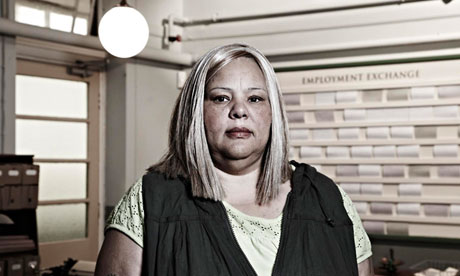
Benefits Britain 1949 (Channel 4) was another time-travel bootcamp. You know the type. The sub-genre of documentary that asks such bold questions as: how will modern schoolchildren cope spending a week as Victorian mudlarks? Or what happens when three dads try to live by the laws of 12th-century Russia? Or what will young mum Sarah learn when she agrees to give birth in Latin? Excuses, one and all, to bother and berate people on some flimsy historical premise until they burst out crying, and have the narrator conclude: "Well, I guess we've really learned something."
In for an old-school bothering this week were benefits claimants Karen, Craig and Melvyn. Karen had arthritis, diabetes, heart problems and high blood pressure. This year, after three decades of employment, she was judged incapable of working, and granted benefits of £155 a week. Wheelchair user Craig had spina bifida but was determined to find work. In the past three years he had sent out more than 1,000 job applications and received, in return, five interviews and not one job. Melvyn was 75 years old, a widower, and getting by on his state pension of £134 a week. And if you read all that and thought: "I'd love to see those three weeping," you were in for a treat.
So off they went, to the dole office of 1949, to meet the pair of postwar pretenders tasked with nudging those unemployed tear ducts into action. Enter icy benefit officer Mrs Townsend and part-time Herman von Rompuy impersonator Mr Goldsack. The dreary duo pored over the statutes of the early welfare state and concluded that – once the figures had been adjusted for inflation – Melvyn and Karen were entitled to £38 each and poor Craig to £7.
Naturally, in the interest of historical accuracy, Goldsack and Townsend had to send the bailiffs in to cart off anything the trio would not have been able to afford on their new weekly incomes. Melvyn waved goodbye to his telly, his washing machine, his car, his bus pass and the contents of his fridge. Karen and Craig lost their tellys, phones and computers. And yet, with the typical selfish pride of people receiving paltry sums of taxpayer's money, all three held back the tears.
But not for long. Melvyn was the first to crack. They rode him hard. Not content with making off with his groceries, Mrs Townsend stopped by to nick the last of his cash for gas and electricity bills, forcing him to pawn his grandfather's watch for £30. Yet still he held out, until a visit from a doctor prompted him to reminisce about his late wife – and, at last, the floodgates opened. The camera followed him into his bedroom and snuck a look at him sobbing through a half-open door. Mission accomplished. As a cheeky coda, they carted him off to live out the week in residential care.
Craig's story saved the show. Though it forced him to live off pocket money, the 1949 regime took finding him work seriously. Craig was sent for an assessment day planting seeds at a garden centre, on the basis of which he was judged fit for office work and granted a day's work experience at a ticket-booking company, which offered him a job, prompting unimpeachable tears of happiness, and lifting the whole show above the complete-waste-of-time level.
Although only as far as one third worthy, two-thirds pointless, because Karen's story was as bleak as Melvyn's. She was angry from the start, furious to see her benefits cut even for a single week, and in no mood to play along with the charades set up for her. When Mrs Townsend told her they would be reassessing her suitability for work – which can't have been much fun the first time, for someone whose every movement causes pain – she lost her rag. "I've done my fucking shit for Britain and I'm doing no more. They can fuck off!" But it wasn't Britain asking her – it was just people trying to make good television by stressing out the already stressed. They got her crying too.
Over on BBC2, Horizon: Monitor Me, was a look at the future of healthcare. Dr Kevin Fong posited a world in which, with the aid of heart-rate, blood sugar, sleep, step and other monitors, each of us could know every intimate detail of our health without ever seeing a doctor, revolutionising our attitudes to exercise, diagnosis and diet. I started sceptical. But, by the end, I was downloading apps, pulling on my trainers and heading out for a run. Moving telly, without the tears.

